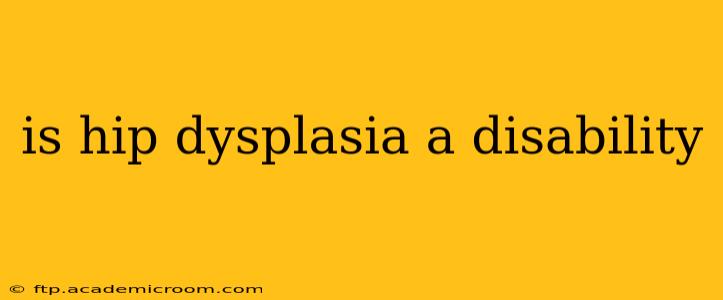Hip dysplasia, a condition where the hip joint doesn't develop properly, can significantly impact a person's life. Whether or not it's considered a "disability" depends on several factors, making it a nuanced question without a simple yes or no answer. This article explores the complexities of hip dysplasia and its potential qualification under disability criteria.
What is Hip Dysplasia?
Hip dysplasia is a condition affecting the hip joint, characterized by an abnormally shallow socket (acetabulum) that doesn't adequately cover the ball (femoral head) of the thigh bone. This misalignment can lead to instability, pain, and, if left untreated, significant long-term consequences. The severity varies widely, ranging from mild cases requiring minimal intervention to severe cases necessitating surgery.
Can Hip Dysplasia Qualify for Disability Benefits?
The determination of whether hip dysplasia constitutes a disability for benefits purposes depends on factors considered by the relevant disability program (like Social Security Disability Insurance or similar programs in other countries). These factors typically include:
- Severity of the condition: The extent of pain, limitation of movement, and impact on daily activities are crucial. Mild cases may not qualify, whereas severe cases causing significant functional limitations often do.
- Medical evidence: Detailed medical records documenting the diagnosis, treatment, and impact on daily functioning are essential. This includes doctor's reports, imaging results (X-rays, MRIs), and physical therapy notes.
- Functional limitations: The assessment focuses on how the hip dysplasia affects a person's ability to perform daily activities like walking, standing, sitting, dressing, and working. This assessment is critical in determining eligibility.
- Age: The impact of hip dysplasia can vary depending on age. In younger individuals, the condition can interfere with development and growth, while in older adults, it can lead to decreased mobility and increased pain.
Therefore, there's no single answer to whether hip dysplasia is automatically a disability. Each case is evaluated individually based on its specific characteristics and the individual's functional limitations.
How Does Hip Dysplasia Affect Daily Life?
The impact of hip dysplasia on daily life varies greatly depending on its severity. Some individuals may experience only mild discomfort, while others face significant challenges. Common issues include:
- Pain: Pain in the hip, groin, and thigh is a common symptom, often worsening with activity.
- Limited mobility: Difficulty walking, climbing stairs, and engaging in physical activities can significantly impact daily life.
- Joint instability: This can lead to feelings of "giving way" or the hip "popping" out of place.
- Arthritis: Over time, hip dysplasia can lead to osteoarthritis, causing further pain and stiffness.
- Sleep disturbances: Pain and discomfort can interfere with sleep quality.
What are the Treatment Options for Hip Dysplasia?
Treatment for hip dysplasia varies according to the severity of the condition and the patient's age. Options include:
- Physical therapy: Helps to strengthen muscles, improve flexibility, and reduce pain.
- Medication: Pain relievers and anti-inflammatory drugs can help manage pain and inflammation.
- Bracing: In some cases, bracing can help stabilize the hip joint and improve its development, particularly in infants and young children.
- Surgery: For severe cases, surgery may be necessary to correct the hip joint's alignment or replace the damaged joint.
Does Hip Dysplasia Always Lead to Disability?
No, hip dysplasia does not always lead to disability. Many individuals with hip dysplasia manage their condition effectively through treatment and lifestyle adjustments. Early diagnosis and intervention are crucial in minimizing long-term effects.
Conclusion: It's Case-Specific
In conclusion, whether hip dysplasia constitutes a disability is determined on a case-by-case basis. The severity of the condition, its impact on daily life, and supporting medical evidence are all factors in this assessment. It's crucial to consult with a healthcare professional and, if relevant, seek guidance from disability benefit programs to determine eligibility.
